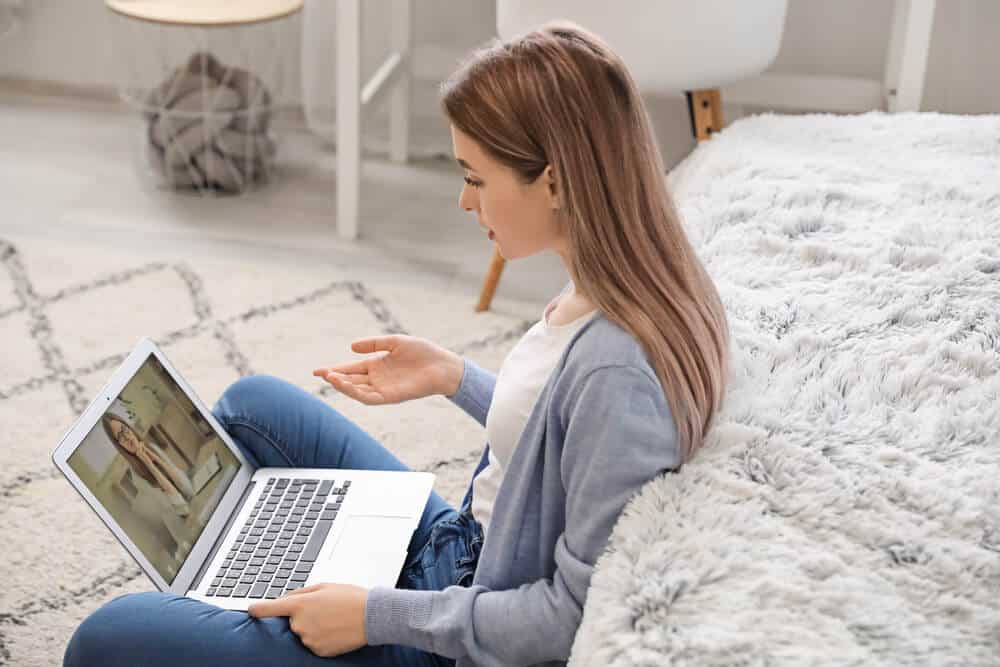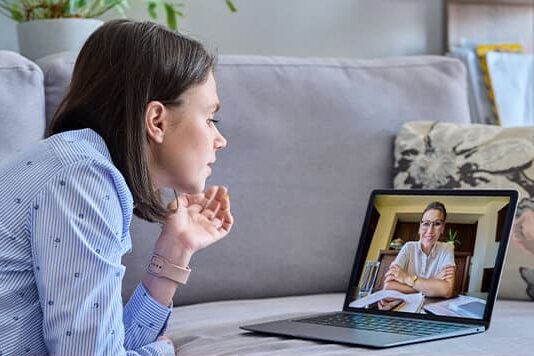When the Normal Feelings of Anxiety Become a Problem
We all experience feelings of anxiety and worry during stressful events in our lives. However, anxiety can become a severe and consistent presence that can affect a person’s physical health, emotional well-being, and everyday functioning. Someone with an anxiety disorder can experience excessive, irrational worry which interferes with the ability to function in daily life. Several coping skills for anxiety can reduce symptoms and progression of anxiety into a disorder. However, it is essential to seek mental health anxiety help if you continue to experience persistent and excessive anxiety that you cannot control, affecting your ability to function. Several options for mental health treatment are available, including virtual therapy online, which can be more accessible for many.
How Common Is Anxiety?
Anxiety disorders are the most common mental health disorder, affecting nearly 30% of adults at some point in their lives. Some people may experience anxiety for a short period in their lives, others may struggle with a disorder for most of their lives needing medication, therapy, and coping skills for anxiety to manage it. Several types of anxiety disorders include generalized anxiety disorder, social anxiety, agoraphobia, panic disorder, separation anxiety disorder, various phobias, and even substance use-induced anxiety. Anxiety can develop at any stage in life and is more common in women than in men.
11 Coping Skills for Anxiety
When anxiety affects daily life or relationships, it may be time to see a healthcare provider. They can rule out any underlying medical issues before referring to a mental health professional. Anxiety disorders need psychotherapy or medications to control; however, lifestyle changes and coping skills for anxiety can also help you manage symptoms. Here are coping skills for anxiety you can begin using today.
- Avoid substance use: Drug and alcohol use can worsen anxiety symptoms. It may be tempting to self-medicate with substances when dealing with anxiety. However, the rebound effects of drugs and alcohol can worsen symptoms and run the risk of developing a substance use disorder.
- Get adequate sleep: Make it a priority to set aside at least 8 hours of sleep each time. Not getting enough sleep can lead to worsening symptoms. Several ways to improve your sleep include sleeping simultaneously each night, reducing screen time before bed, meditating, and sleeping in a cold, dark room.
- Keep moving: Most days of the week, physical exercise is a powerful stress reducer. It can improve mood by regulating neurotransmitters and brain chemicals responsible for mental health. Even a daily walk outside can make a big difference.
- Quit smoking and cut back or quit caffeinated beverages: Both nicotine and caffeine are stimulating and can worsen anxiety.
- Eat a healthy diet: A well-balanced diet includes whole grains, vegetables, fruit, and lean, organic meats. Proper nutrition is essential for regulating brain chemistry and maintaining mental health.
- Incorporate stress management and relaxation techniques: Each person relaxes differently and it is essential to find healthy ways to do so, such as yoga, meditation, art, listening to music, or spending time outside.
- Keep a journal: Keeping track of your personal life or simply writing about issues you are dealing with can help your mental health. It can help you identify what’s causing stress and what helps it.
- Socialize with friends and family: Isolation can make anxiety symptoms worse. Take care of your social health by making time for friends and family. They are also your support system and you should talk to them about any issues you are dealing with.
- Learn about your disorder: Many books, online forums, and websites about anxiety disorders exist. Learning about anxiety disorders can help you understand why you feel that way and ways to help yourself, including treatment options.
- Identify triggers: Learn what situations or actions cause you anxiety, so you can avoid these triggers or be prepared to calm yourself down through breathing exercises and grounding when encountering them.
- See a mental health specialist: While there are plenty of coping skills for anxiety, the best way to get control of your anxiety is through professional treatment. Medications and psychotherapy, like cognitive behavioral therapy, can significantly reduce symptoms and teach you better tools and skills to use.

Can Virtual Therapy Help with Anxiety?
Virtual therapy can be an excellent choice for anxiety. Treatment for anxiety and anxiety disorders usually involves talk therapy, which can quickly be done through voice, video, or text chats online. Just as with in-person therapy, virtual therapists are also trained and licensed to carry out evidence-based therapies such as cognitive behavioral therapy and dialectical behavioral therapy. Virtual therapy can also be more accessible because it provides a more comfortable way to communicate for some and is also more affordable. Individuals may also stick to their treatment plans more quickly as they can access sessions from anywhere, there is zero travel time, and treatment is more affordable. They can also access virtual therapy groups to talk to others dealing with similar issues and provide mutual support to one another.
Who Is Most at Risk of Anxiety?
Most people can experience anxiety during stressful periods of their life. However, some people are at higher risk for developing anxiety disorders. There is no single cause of anxiety; it is a combination of factors that can lead to developing anxiety. One of the most significant risk factors of anxiety is genetics. You are more likely to have anxiety if a close relative also deals with it, but there usually needs to be an event or series of events that trigger a disorder. Trauma, constant stress, and substance abuse can also trigger anxiety in someone who is predisposed to it. Research also shows that brain chemistry can play a role. Some people develop anxiety due to an underlying medical condition such as hypothyroidism or menopause. Developing coping skills for anxiety can help anyone, no matter the cause, reduce symptoms and slow or stop the progression of a disorder.
Call Mindfuli and Learn Coping Skills for Anxiety
Mindfuli offers virtual mental health help to California residents struggling with anxiety. We expertly match you to peer counselors and therapists within minutes through our Care PairingTM Technology. Patients can choose the level of service to fit their needs and budget, which can be canceled at any time. Appointment times are available Monday through Friday from 8 a.m. to midnight and accessible from anywhere through our HIPAA-compliant online portal. Patients receive evidence-based therapies and learn effective coping skills for anxiety to manage their symptoms for a lifetime.
If you are struggling with anxiety, please visit us online to complete a brief personal profile and quickly get started with treatment. Please call us at 888-703-3004 if you have any questions or would like to learn more about how Mindfuli works.
